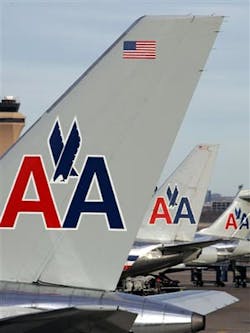American Airlines' Parent Reports $15M Profit in 3Q
The parent of American Airlines, the nation's biggest carrier, reported a slim profit for the third quarter as rising revenue offset higher fuel costs.
It was the company's first back-to-back quarterly profit in six years, and shares of AMR Corp. jumped 7.5 percent.
Analysts expect several other leading U.S. carriers to soon report their second straight profitable quarter, and they say the recent dip in fuel prices could lift airline profits the rest of the year.
But airline executives, including the leader of American, said it was far too early for the carriers to declare victory after a long slump that has seen them lose more than $50 billion.
AMR said Wednesday it earned $15 million, or 6 cents per share, in the quarter ended Sept. 30, compared to a loss of $153 million, or 93 cents per share, a year earlier.
Revenue rose 6.6 percent to $5.85 billion from $5.5 billion a year ago.
The results included a $99 million charge to reduce the value of fuel-hedging contracts. Without that write-down, AMR said it would have earned $114 million, or 45 cents per share.
Analysts expected the company to earn 42 cents per share before one-time items on sales of $5.90 billion, according to a survey by Thomson Financial.
AMR shares rose $1.80, or 7.5 percent, to close at $25.90 on the New York Stock Exchange.
AMR, which also owns the American Eagle regional airline, said it paid $1.77 billion for fuel, $189 million or 11.9 percent more than a year ago. But a recent dip in prices led AMR Wednesday to cut $528 million from its July forecast of fuel spending for the second half of 2006.
Fort Worth-based AMR was also helped by strong demand for travel, which has allowed carriers to raise fares. American flights ran 81.7 percent full on average, up from 81.2 percent a year ago.
The results would have been better without an August terror scare. American estimated it lost $50 million in revenue after British authorities said they broke up a plot to bomb trans-Atlantic flights.
Chairman and Chief Executive Gerard Arpey said the results show progress in the face of new challenges.
American was the first major U.S. airline to report third-quarter results, and analysts expect the industry to post back-to-back profitable quarters for the first time since 2000. But Arpey said AMR and its rivals still face hard work to recover from a long and deep slump.
"The industry is a long way from turning any corners," Arpey said. "The industry has lost $50 billion since the year 2000, and taken on billions and billions of dollars of debt. In a very, very strong U.S. and international economy, it's producing very modest pretax (profit) margins."
The comments echoed those of Gary Kelly, chief executive of Southwest Airlines Co., the most profitable U.S. carrier. He worried that the recent drop in fuel prices could be temporary and that travel demand has softened since summer.
"The airline balance sheets are in terrible shape," Kelly said. "The earnings are nowhere near where they need to be to compensate investors."
Southwest and Continental Airlines Inc. are scheduled to report their third-quarter results on Thursday.
Ray Neidl, an analyst with Calyon Securities, said he expected slightly better results from AMR, but that when considering the London scare, "They did fairly well."
Neidl said American will face growing pressure to control costs and sell a better mix of fares - more seats at higher fares; fewer at deep discounts - to boost revenue. Airlines are now in the typically slow fall period, but Neidl said American should be able to raise prices again next spring.
"If the economy remains strong next year and if fuel moderately declines, it could make 2007 a banner year," he said.
Besides uncertainty about the economy and fuel prices, American faces other problems. It is burdened with $19 billion in debt - the chief financial officer said AMR could sell investments to pay down debt.
And American faces brand-new competition in Texas from Southwest. Under a new law, Southwest can sell one-stop tickets from Dallas Love Field to anywhere in the country, competing with American flights at nearby Dallas-Fort Worth International Airport.
Arpey said Southwest's service - previously barred by a 1979 federal law that applied only to Love Field - "will undoubtedly put pressure on our revenues." He didn't offer any numbers.
For the first nine months of the year, AMR earned $214 million, or 91 cents per share, compared to a loss of $257 million, or $1.58 a share, in the same period of 2005. Revenue is up 10.4 percent so far this year, to $17.17 billion.
News stories provided by third parties are not edited by "Site Publication" staff. For suggestions and comments, please click the Contact link at the bottom of this page.

